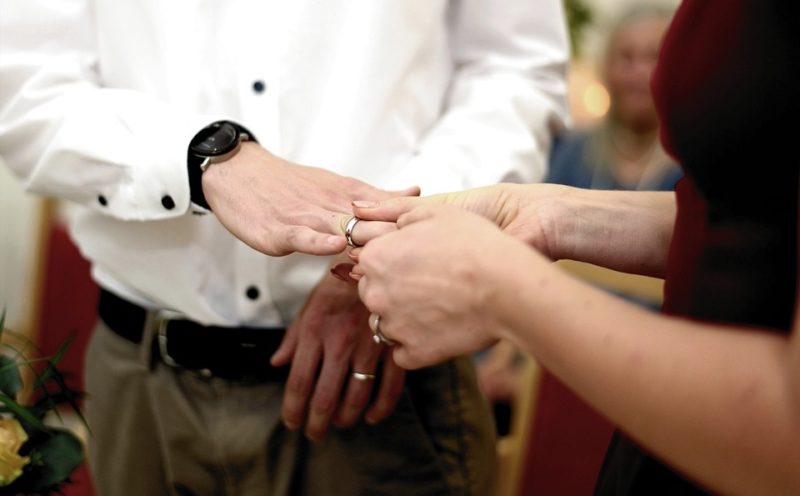If you’re curious when do you say I do in a wedding, wait after the officiant. Below is a sample wedding ceremony order, including a wording template typically told by a wedding officiant to better understand the timing.
You must be familiar with the traditional flow of weddings, including what happens during the vow and ring exchange. We also recommend that you read who goes first in wedding vows.

All About Wedding Vows: When Do You Say I Do In A Wedding
Depending on the wedding style, the wedding officiant can perform the vow exchange for you. What’s left is to say “I do” after each prompt from the officiant.
Do note that the bride and groom will exchange vows at some weddings. There is no need to say I do as the officiant won’t be asking the traditional “do you take…” to each person.
Sample wedding vows
You will say “I do” at a wedding after the officiant asks you the traditional question seen in most wedding ceremonies. This type of ceremony and vow exchange is ideal for couples who prefer not to write their own vows because they’ll only be promising their spouse regarding what the officiant says.
Respond with “I do” in the following sample wedding vow exchange script:
Officiant: Do you [groom’s name], take [bride’s name] to be your lawfully wedded wife?
Groom: I do.
Officiant: Do you promise to love, honor, and cherish her throughout your lives? To respect and comfort her, to keep her in sickness and in health?
Groom: I do.
Officiant: Do you promise to share your joys and sorrows? And to be faithful to her alone?
Groom: I do.
Officiant: Do you [bride’s name], take [groom’s name] to be your lawfully wedded husband?
Bride: I do.
Officiant: Do you promise to love, honor, and cherish him throughout your lives? To respect and comfort him to keep him in sickness and in health?
Bride: I do.
Officiant: Do you promise to share your joys and sorrows? And to be faithful to him alone?
Bride: I do.
An alternative to the script above is to combine all the questions in one phrase. For example, the officiant will ask the groom; first, he’ll answer with “I do” before the officiant repeats the same single combined question to the bride, who will also respond with “I do.”
Ring exchange scripts
There are different types of wedding ceremonies. Typically, the vow exchange precedes the ring exchange as the rings act as the seal of the bride and groom’s promises to each other.
However, some weddings combine the two exchanges. For example, as the couple exchanges their vows, they’ll put the ring on their partner’s finger as the latter says, “I do.”
Officiant: Do you [groom’s name], with this ring, take [bride’s name] to be your wife, to have and to hold, from this day forward, for better or for worse, for richer or poorer, in sickness and in health, to love and honor her until death do you part?
Groom: I do. (while wearing the ring)
Officiant: Do you [bride’s name], with this ring, take [groom’s name] to be your husband, to have and to hold, from this day forward, for better or for worse, for richer or poorer, in sickness and in health, to love and honor him until death do you part?
Bride: I do. (while wearing the ring)
Sometimes, the officiant would not facilitate the ring exchange if it’s separate from the vow exchange. So instead, the couple will offer the ring to their partner with a spoken oath like this:
Groom/bride: I give you this ring as a sign of my faithfulness. I will always cherish and love you, and honor the vows spoken here today.
There’s no need to say “I do,” as either person is answering a promise.
Do you want to give your future spouse a unique wedding band during the ring and vow exchange? Read what to engrave on a wedding band!
Do You Say I Do Before Or After The Rings?
Usually, you’ll speak I do before the rings because the vow exchange happens before the ring exchange, as the latter symbolizes your promises. However, the vow and ring exchange can also be combined, so you can say I do after wearing the ring from your spouse or after the officiant asks you.
Do You Say I Will Or I Do At A Wedding?
Should you choose “I will” or “I do” for your vows? There is no right answer because both indicate that you’re promising your partner.
But with modern weddings and those previously seen in royal weddings, the couples exchanged “I will” instead of the traditional “I do.” Some interpreted it that it will sound more willing and genuine than promising you’ll do something.
Why Do You Say I Do At A Wedding?
They say and exchange “I dos” or “I will” at a wedding to signify their commitment and desire to fulfill whatever is spoken at the vows. The traditional ceremony script mentioned by officiants indicates loyalty and love during the marriage in all conditions.
Conclusion
Was this ceremony guide helpful? To recap when do you say I do in a wedding, it’s during answering the wedding officiant.
You can also say I do during ring exchange if it happens simultaneously with the vow exchange. But if you don’t want to use a traditional script, I dos are possibly omitted.
